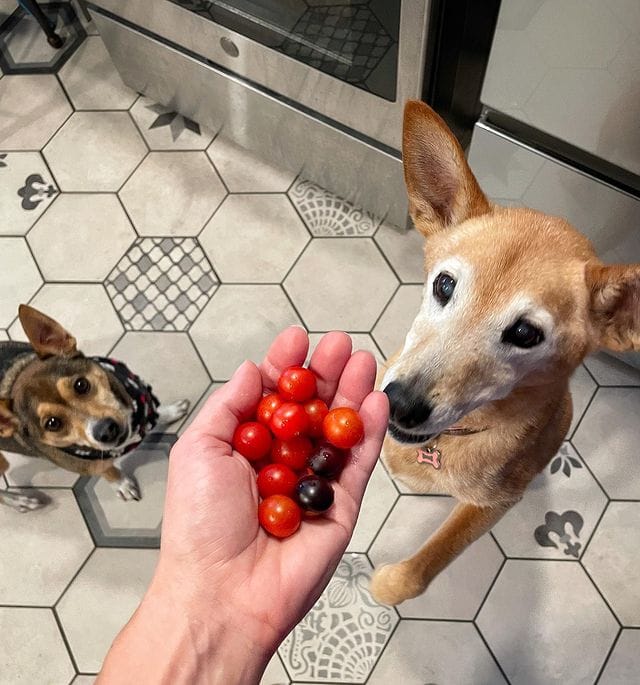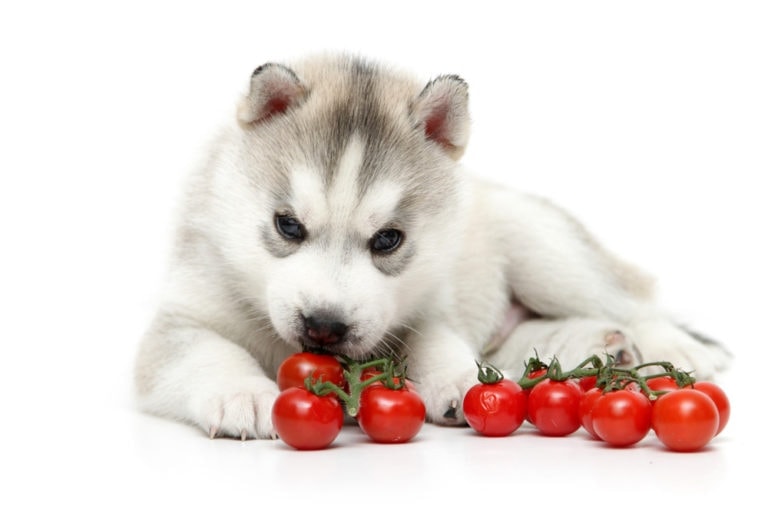Tomatoes pretty much go with everything from salads and sandwiches to sauces. It’s not so hard to see why considering their nutritional profile and how well they complement other flavors. However, it is an ingredient found often in dog foods. So, can dogs eat tomatoes?
The answer is both a yes and a no. It all depends on the color. Green, unripe tomatoes are poisonous to dogs and should be avoided at all costs. On the other hand, red tomatoes are safe to feed to dogs in moderate amounts.
You will learn shortly exactly why the color of the tomato is so important and what could possibly go wrong if you feed your dog the wrong kind of tomatoes.
That way, you will have all the information you need to make an informed decision regarding how to safely introduce tomatoes to your dog’s diet, whether as a snack or part of homemade dog food.
Can Dogs Eat Tomatoes?
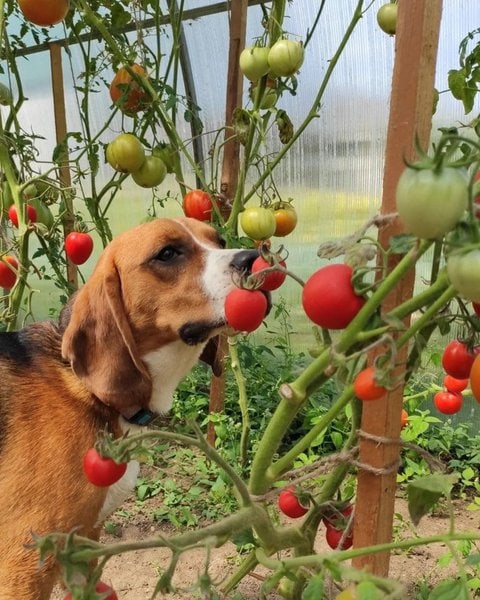
Whether or not dogs can eat tomatoes depends on their color, which is determined by their ripeness. In a nutshell, red tomatoes are safe for dogs, while green ones are poisonous.
Let’s take a closer look at these two options and what feeding them to your dog means for their health.
Ripe Tomatoes (Red)
Ripe tomatoes are not only safe for your dog to eat but also healthy as they are packed with numerous crucial nutrients.
These nutrients include vitamins like vitamin C, which plays a huge role in ensuring your dog’s immunity remains strong and functions optimally.
Tomatoes are also a great source of vitamin K useful in the clotting process as well as vitamin B9, which is also known as folate. The folate is crucial in the formation of DNA in every cell and is especially important for puppies and pregnant dogs.
In addition to these vitamins, ripe tomatoes offer your dog antioxidant effects for healthier cells and reduced risk of health issues like cancer.
Unripe Tomatoes (Green)
On the flip side, green tomatoes are toxic to dogs. It is due to the presence of a chemical compound known as Solanine. In addition to its abundance in green tomatoes, it is present in concentrated amounts in green parts of the plant, including the leaves and stems of the tomato.
The solanine in unripe tomatoes causes trouble in many different systems, from gastrointestinal upset to dysfunction in the cardiovascular system. Any of the affected systems could result in life-threatening complications for your dog, which is why it is best to avoid unripe tomatoes altogether.
As the tomato ripens, the concentration of solanine reduces significantly, which is why red tomatoes are considered safe.
What Happens If Dogs Eat Unripe Tomatoes?
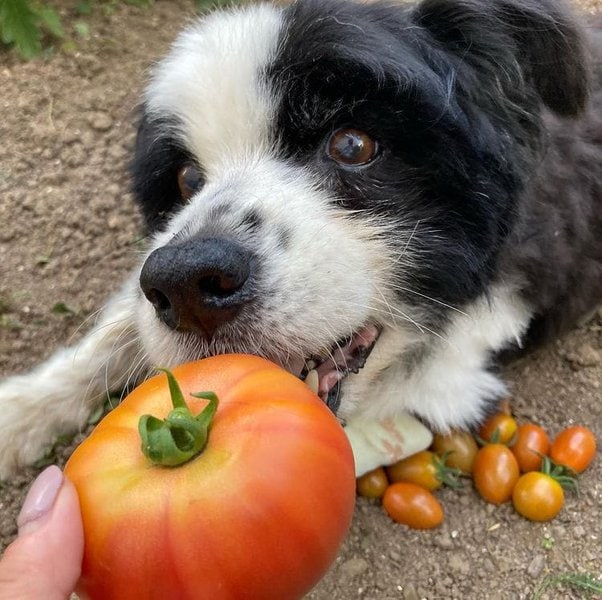
When dogs eat unripe tomatoes, they consume concentrated amounts of a compound known as solanine. This results in issues in one or more important systems, which could eventually have fatal outcomes.
Here is a bit more on 3 of the most commonly affected of these systems and how their compromise could manifest in your dog after they consume unripe tomatoes.
Digestive System
Solanine affects the digestive system faster and often more dramatically than any other system. This is because this is where the substance is released and absorbed. The solanine causes irritation of the dog’s digestive system and results in signs and symptoms including:
Issues like vomiting and diarrhea could leave your dog dehydrated and at risk of developing kidney injury, which could be fatal.
Central Nervous System
Once the solanine makes its way into the dog’s bloodstream, one of its destinations is in the central nervous system, where it wreaks a lot of havoc. Some of the clues that your dog’s brain is compromised in these cases include:
- Confusion
- Loss of coordination
- Tremors
- Seizures
- Altered levels of consciousness
Cardiovascular System
The heart is another target of solanine that typically takes a big hit when a dog consumes unripe tomatoes. Poisoning from this toxic compound affects the heart muscle and conductive system resulting in issues like:
- Abnormal heart rate
- Abnormal heart rhythm
- Heart failure
How Many Tomatoes Can Dogs Eat?
Your dog can have 1 to 2 slices of ripe tomatoes every other day or a few times a week. Larger dog breeds can handle ½ a tomato without consequence. Moderation is important even with ripe tomatoes which are typically considered non-toxic to dogs.
It is because even while ripe, tomatoes are very acidic. Allowing your dog to consume too much could result in gastric irritation which is similar to what you may be familiar with as heartburn.
In cases where the dog consumes too much, the tomatoes could cause issues like vomiting, abdominal pain, and reduced appetite.
If your dog already has gastrointestinal issues from other illnesses, it is best to avoid the tomatoes completely, as even that small serving could worsen the dog’s discomfort.
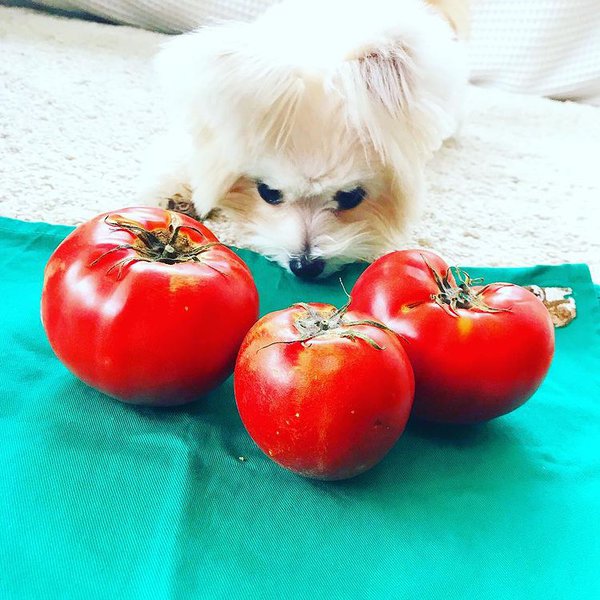
Can Dogs Have Tomato Sauce?
Dogs should not be allowed to have tomato sauce.
The main reason for this restriction is the fact that tomato sauce is typically made, including other ingredients that may be toxic to the dog. The most common offenders, in this case, are garlic and onions.
Cheese that is present in many tomato sauce recipes could also be problematic especially for lactose-intolerant dogs but also for those that can handle dairy.
Furthermore, tomato sauce is bad for dogs because of the number of tomatoes used. It is difficult to control the amount of tomato that your dog consumes when it is in sauce form. It is therefore very easy to end up overfeeding your dog with the potentially toxic ingredient resulting in an upset tummy.
In conclusion, it is best to avoid giving your dogs tomato sauce at all costs. Even if the sauce is free of toxic ingredients, the risks are still too high to avoid. The same case applies to other tomato-based products like ketchup and tomato paste that should be avoided completely.
